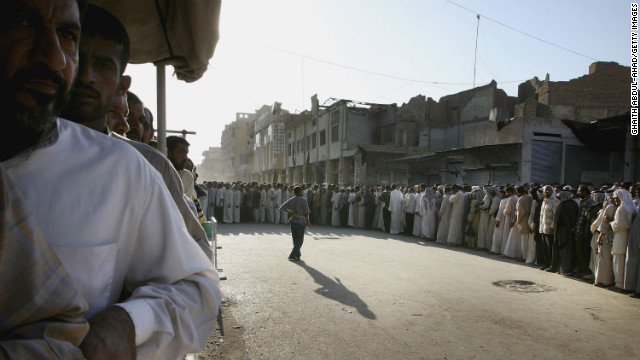Iraq isn’t as fragile as it looks

Editor’s note: Lowell Schwartz is a political scientist at the RAND Corporation. He was an advisor to the U.S. Department of Defense on arms control and European security in 2009-2010. The views expressed are his own.
Ten years after the Iraq war started, violence may persist as the shift from Saddam Hussein’s totalitarian regime to one dominated by nationalist Shiites continues – a point underscored by a string of bombings overnight. Yet despite much pessimism, the new order survives, without U.S. assistance. And it is a lot less fragile than it often appears.
Back in 2003, when U.S. forces arrived in Baghdad, they were shocked by the complete disintegration of the Iraqi state – U.S. analysts had failed to comprehend the tremendous impact international sanctions and international isolation had had on Iraq’s economy and society.
The extreme erosion of the Iraq state, meanwhile, had two profound consequences. First, once the regime was unseated, power rapidly filtered down to the regional and tribal level. Second, a new national political order had to be built from scratch.
The creation of this new political order began after Iraq’s first general election in December 2005. The election was more a census than a genuine democratic process, with the majority Shiite population (about 60 percent of Iraq) voting largely for a Shiite Islamic bloc of parties, the United Iraqi Alliance. The unity of Shiite voters virtually ensured Shiite dominance of any democratically elected government. After a period of flux, Nuri al-Maliki was named prime minister, and he has remained the dominant force in Iraqi politics ever since.
More from CNN: Why war was fought for oil
Al-Maliki is an Iraqi nationalist who from the beginning has sought to bolster the power of the national government to control the country. At the same time, he has sought to ensure as much as possible that the institutions of the state are loyal to the new Shiite majority and his rule. He has sought to remove foreign influences upon the Iraq state, including the U.S. military occupation of the country and Iranian meddling in Iraqi domestic affairs. But while from an America perspective, he is often viewed as excessively friendly to Iran, he has not hesitated to resist Iranian pressure and to go after Iranian-backed groups when he has felt it necessary.
All this means that the fight to establish and maintain the first Shiite dominated government in the Arab world has been successfully achieved, although at a brutal cost. In the face of multiple insurgencies, which unleashed extreme violence that included thousands of civilian deaths per month during the worst periods, elements within the government of Iraq resorted to ethnic cleansing. These steps made it more difficult for Sunni insurgents to hide or blend in with the population. The population of Baghdad, which previously was 35 percent Sunni, today is only 10 percent to 15 percent Sunni after the flight of many refugees to various Arab states.
Iraq’s Sunni regional neighbors also feared the country’s new Shiite elite. They provided support for the insurgencies that developed, including money, materiel, and fighters. It was only when the violence in Iraq threatened to spill across the country’s borders that regional governments rethought their positions and began establishing normal diplomatic relations with the Iraqi government. The final step in the region’s acceptance of Iraq’s new political order was the holding of the 2012 Arab League summit in Baghdad – the first summit to be held in Baghdad since 1990, and which was attended by all of the major powers in the region.
These security challenges had to be faced at the same time as the Iraqi state, with U.S. help, was attempting to build a new infrastructure for governing. New security forces had to be recruited, organized and equipped; government ministries for basic services such as water, oil, and electricity had to be organized and staffed; and the division of power between regional and national authorities had to be established.
Yet while Iraq remains one of the most corrupt and difficult places in the world to conduct business, the Iraqi government has made some progress in stabilizing the situation. Oil production is now at its highest level in decades, security forces loyal to the government now patrol the barriers originally established by U.S. forces, and the amount of electricity supplied to the country has grown.
As noted in a 2009 RAND report, since 2008 there has been an important shift in the political dynamics of Iraq, with all of the main political factions (Sunni, Shiite, and Kurd) largely eschewing violence in favor of political involvement to advance their agendas. Daily violence in Iraq today is conducted by extremist forces that so far lack the ability to reignite the large-scale factional violence that occurred in 2006 and 2007.
Over the last two years, meanwhile, al-Maliki has undoubtedly tested the proposition that the political influence of Sunnis and Kurds can be marginalized without igniting widespread instability. In December 2011, an arrest warrant on terrorism charges was issued for the country’s Sunni vice president, Tariq al-Hashemi, who then fled to Turkey. In addition, Hashemi’s bodyguards were given death sentences in connection with the case. These charges and arrests initiated protests by Sunnis, who demanded a broader role in the country’s decisionmaking.
And, despite all this pressure, al-Maliki has not backed down. With the power of the Iraqi state at their disposal, al-Maliki and other Shiite leaders appear to believe they can weather the violent attacks and political pressure that they see as an attempt to overturn the new political order. Given the forces the Shiite political order has already withstood, it seems likely the status quo will continue for the foreseeable future.
cdn.turner.com
